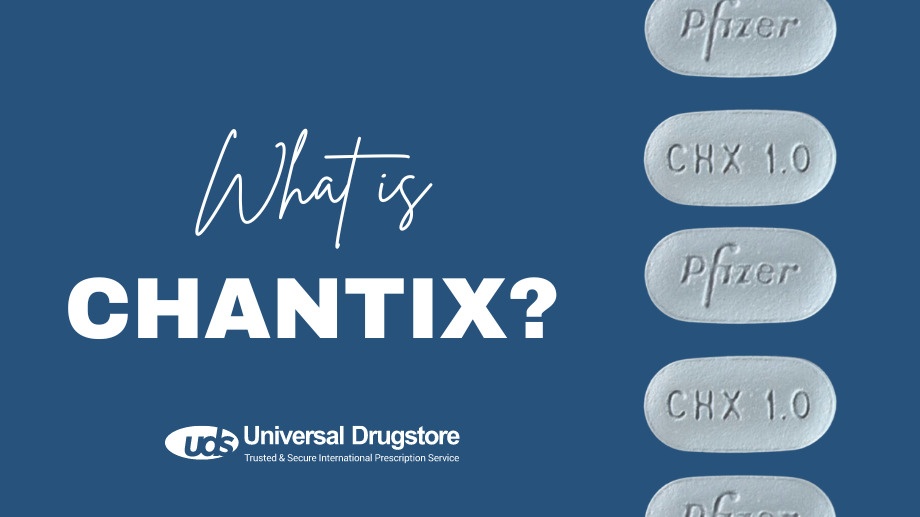What is Chantix?


Chantix (varenicline) is manufactured by Pfizer inc to help adults stop smoking. Smoking cessation helps lower your risk of lung and heart disease, as well as cancer. Chantix, however, does come with some serious side effects.
How does Chantix work?
Varenicline, the active ingredient in Chantix, is a selective nicotinic receptor partial agonist that works by blocking nicotine’s effects in the brain. This, in turn, stops your desire to smoke.
What doses of Chantix are available?
Chantix comes as a varenicline tartrate tablet in both 0.5 mg and 1 mg strengths.
How do you use Chantix?
Follow all directions given by your doctor and read all prescribing information and FDA-approved product labeling and Medication Guide before using Chantix. You should begin Chantix one week before you set your quit date to stop smoking or you can quit smoking between days 8 and 35 of treatment.
From the first until the third day of treatment, start with 0.5 mg once daily. Then on days four through seven, take 0.5 mg twice daily. In the subsequent weeks, take a 1 mg tablet twice daily for up to 12 weeks. If you’ve successfully quit smoking after 12 weeks, an additional 12 weeks of treatment is recommended to increase the likelihood of long-term abstinence.
Chantix should be taken after eating and with a full glass of water.
If you do not believe you can stop smoking immediately, your doctor may change the quantity and number of weeks of treatment that you undergo. Speak to your doctor about what course of treatment works best for you. If there is a missed dose, take it as soon as you remember. However, if it is within 12 hours of your next dose, do not take the dose, and instead resume your schedule as normal with the next scheduled dose.
What are the side effects of Chantix?
The most common side effects of Chantix in clinical trials compared to placebo include:
-
Abnormal (unusual, vivid, or strange) dreams
-
Trouble sleeping
-
Constipation
-
Nausea (most common side effect)
-
Flatulence
-
Vomiting
-
Shortness of breath
-
Nicotine withdrawal symptoms, including:
-
Urge to smoke
-
Depressed mood
-
Trouble sleeping
-
Restlessness
-
Increased appetite
-
Weight gain
-
Rarely, Chantix may cause some serious adverse reactions, including:
-
Neuropsychiatric adverse events
-
This includes mental health issues such as changes in mood, depression, mania, hallucinations, psychosis, paranoia, homicidal ideation, suicidal thoughts, aggression, and more.
-
You and a designated caregiver should watch for any abnormal behavior changes and reach out for medical help if you have any concerns.
-
-
Seizures
-
Chantix lowers your seizure threshold. New or worsening seizures could occur.
-
-
Changes in motor control
-
Until you know how Chantix affects you, operate machinery with caution and reduce the amount of alcohol you consume. Accidental and sometimes life-threatening injuries could occur.
-
-
Cardiovascular events
-
There is an increased risk of cardiovascular (CV) events in patients with underlying CV disease. However, these concerns must be taken into consideration when comparing the health benefits of smoking cessation.
-
Notify your healthcare providers of new or worsening CV symptoms.
-
Seek immediate medical attention if you experience signs and symptoms of a heart attack or stroke.
-
-
Sleepwalking
-
Discontinue Chantix if this occurs.
-
-
Serious skin reactions
-
Rare, sometimes life-threatening skin reactions can occur.
-
Discontinue Chantix and contact a healthcare provider immediately if you see a skin rash with mucosal lesions.
-
Contact your healthcare professional for medical advice about any possible adverse effects you experience while taking Chantix. You can report your adverse effects to the U.S. Food and Drug Administration at 1-800-FDA-1088 or www.fda.gov/medwatch.
Chantix drug interactions
When Chantix is taken with other prescription drugs, over-the-counter medications, vitamins, and supplements, it may change how they work or increase the frequency or severity of side effects. Some drug interactions with Chantix include:
-
Nicotine replacement therapies
-
For some smoking cessation medications, such as bupropion, it is not known whether Chantix can be used alongside them. Talk to your doctor about what is best for you.
-
Due to worsening adverse events, there are high rates of discontinuation when Chantix is taken with the nicotine patch.
-
-
There is evidence that some medications (ex: theophylline, warfarin, insulin) need dosage adjustments while taking Chantix.
Chantix precautions
You should be sure that your healthcare provider is aware of all your medical conditions, including if you have:
-
A history of seizures
-
Any allergies to the ingredients in Chantix. Symptoms of an allergic reaction could include:
-
Swelling of the face, mouth, neck, or throat
-
Trouble breathing
-
Blisters in your mouth
-
Rash with peeling skin
-
-
A pregnancy, plan to become pregnant, or are breastfeeding
-
It is unknown whether Chantix passes through breast milk. If you breastfeed and take Chantix, make sure to monitor your baby for seizures.
-
-
Used or are using other treatments to quit smoking. Chantix with a nicotine patch may cause more severe side effects than if you just use a nicotine patch alone.
-
Have kidney problems or get dialysis for your kidneys
-
Drink alcohol
-
Heart or blood vessel problems
-
Have any other medical conditions
Is there a generic available for Chantix?
Chantix is a brand-name medication that currently has a generic version available.
How do you store Chantix?
Store at room temperature around 77ºF (25ºC). Keep away from direct sunlight and out of the reach of children.
Related medications
Zyban (bupropion hydrochloride SR)
Tyrvaya (Emtricitabine)
Sources
Medication Guide: https://labeling.pfizer.com/ShowLabeling.aspx?id=557
WebMD: https://www.webmd.com/drugs/2/drug-144470/chantix-oral/details
Drugs.com: https://www.drugs.com/compare/chantix


